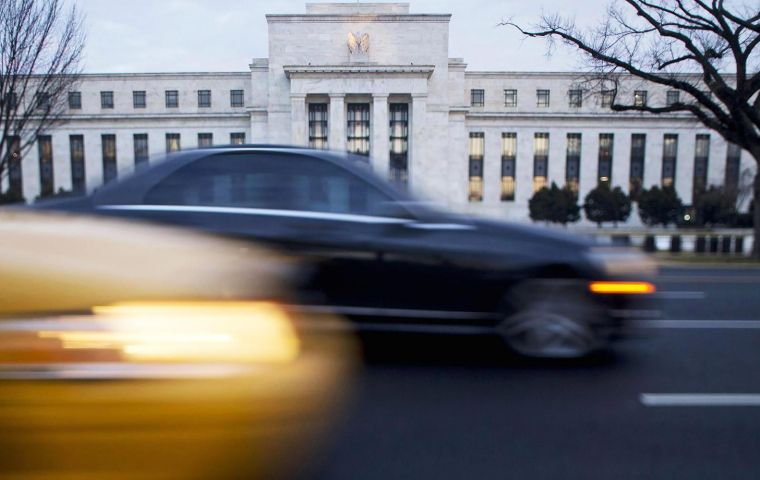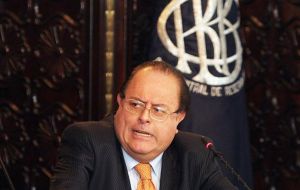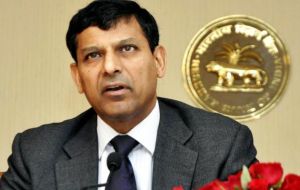MercoPress. South Atlantic News Agency
Fed's rate decision next week: conflicting positions between US voters and EM central bankers
 The poll found respondents want the Fed to do what it can to create more jobs and spur the sort of wage gains that have eluded much of the US
The poll found respondents want the Fed to do what it can to create more jobs and spur the sort of wage gains that have eluded much of the US  “The uncertainty about when the Fed hike will happen is causing more damage than the Fed hike will itself” Peru's central bank governor Julio Velarde
“The uncertainty about when the Fed hike will happen is causing more damage than the Fed hike will itself” Peru's central bank governor Julio Velarde  Mexico's Agustín Carstens told the bankers meeting in Jackson Hole that a Fed rate rise indicating a stronger US economy would be “for us, very good news”.
Mexico's Agustín Carstens told the bankers meeting in Jackson Hole that a Fed rate rise indicating a stronger US economy would be “for us, very good news”.  “It’s preferable to have a move early on and an advertised, slow move up rather than the Fed be forced to tighten more significantly down the line”, said Rajan.
“It’s preferable to have a move early on and an advertised, slow move up rather than the Fed be forced to tighten more significantly down the line”, said Rajan. As the Federal Reserve gets ready to debate its interest rate policy stance next week, a poll released Thursday finds a strong majority of US voters surveyed want central bankers to refrain from boosting short-term interest rates, and to instead concentrate on using monetary policy to further boost the job market.
However a piece from the Financial Times published on Wednesday said that emerging markets central bankers want the Fed to raise interest rates, sooner than later and end with the uncertainty and 'agony' of the countdown that has been going on for months.
The poll found that respondents have inflation concerns, but even so, they still want the Fed to do what it can to create more jobs and spur the sort of wage gains that have eluded much of the nation. The poll of 716 registered voters also found respondents wanting greater public input into the central bank's decision making.
The survey was conducted in early September by Public Policy Polling under the direction of the left-leading Center for Popular Democracy. The group has been actively arguing against any move to raise short-term interest rates from current levels. Over recent months, its activists have been meeting with regional Fed bank president to press their case. The group also brought their case this year's high-profile central bank research conference in Jackson Hole, Wyoming.
In the survey, 62% of respondents said high unemployment remains a “major problem,” and 60% said low wages and weak incomes were also significant concerns. Half said the same thing about inflation. Just over half of respondents said the Fed should use its policy tools to prioritize job creation and stronger wage gains--versus 38% who want the central bank to direct its main focus to controlling inflation.
“There is no threat of inflation,” said Connie Razza, Director of Strategic Research with the CDP. The poll shows Americans believe “the U.S. economy is not healthy enough to raise rates right now,” she said in a conference call with reporters discussing the survey.
Nearly two-thirds of respondents believe the US economy could benefit from maintaining low rates, and a similar amount want to see the current ultralow rates maintained.
However Mirza Adityaswara, senior deputy governor at Indonesia’s central bank, said “we think US monetary policymakers have got confused about what to do. The uncertainty has created the turmoil”.
He added “the situation will recover the sooner the Fed makes a decision and then gives expectation to the market that they [will] increase [rates] one or two times and then stop.”
Julio Velarde, Peru’s central bank governor, said most EMs wanted the Fed to raise rates “as soon as possible”. “The uncertainty about when the Fed hike will happen is causing more damage than the Fed hike will itself,” he said.
The comments echo those made by Agustín Carstens, Mexico’s top central banker, who told Reuters at a meeting of monetary officials in Jackson Hole last month that a Fed rate rise indicating a stronger US economy would be “for us, very good news”.
At the same conference, Raghuram Rajan, governor of India’s central bank, told the Wall Street Journal: “It’s preferable to have a move early on and an advertised, slow move up rather than the Fed be forced to tighten more significantly down the line”.
The Fed is set to meet Wednesday and Thursday next week to decide what to do with its near-zero short-term interest rate target. Until only recently, there were fairly broad-based expectations that officials would raise rates at the meeting, ending an unprecedented era of ultralow rates that have prevailed since the end of 2008.




Top Comments
Disclaimer & comment rules-

Read all commentsThe US would love inflation, as long as it can be controlled, because it reduces the burden of their massive debt.
Sep 11th, 2015 - 06:13 pm 0Whether small interest rates will create inflation has to be open to doubt given that we are told all the savings goes into shares and not on deposit.
Will it be this month or December? I think the “confidence” survey due next Wednesday is likely to give a hint at the possibilities.
Commenting for this story is now closed.
If you have a Facebook account, become a fan and comment on our Facebook Page!